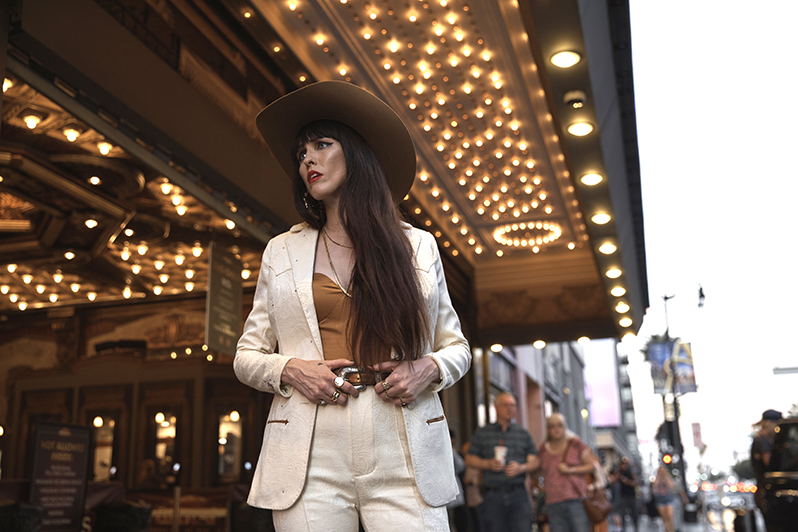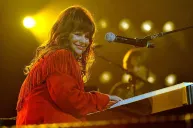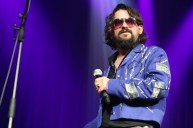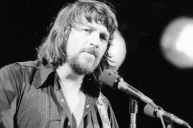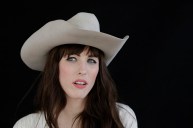Jaime Wyatt has always been drawn to artists who push boundaries -- artists like Johnny Cash, Waylon Jennings, Merle Haggard and Loretta Lynn, who could tackle taboo subjects in "The Pill" and "Rated X" as easily as she could write homespun tales of family and faith. (Those artists "pushed the boundaries of what's okay to talk about and still be loved," Wyatt says.)
Videos by Wide Open Country
Wyatt doesn't shy away from difficult subjects on her recently released outlaw country masterpiece Neon Cross (produced by Shooter Jennings.) In the three years since the release of her 2017 EP Felony Blues, Wyatt battled addiction, got sober after a relapse and dealt with the loss of her father and a close friend. There's pain on Neon Cross, but there's also plenty of redemption and hope. While in recovery, Wyatt reflected on her life and past relationships, which led to her coming out as a gay woman to friends and family. The joy of finally being able to be herself is reflected throughout the record, specifically on the vivacious "Rattlesnake Girl."
"My experience with recovery made me realize I lost years of my life being in the closet and living a lie and trying to be someone else," Wyatt said in a press release. "I just can't do it anymore."
Wide Open Country caught up with Jaime Wyatt to talk about working with Shooter Jennings, singing with Jessi Colter and how telling her truth set her free. Read our Q&A with Wyatt below.
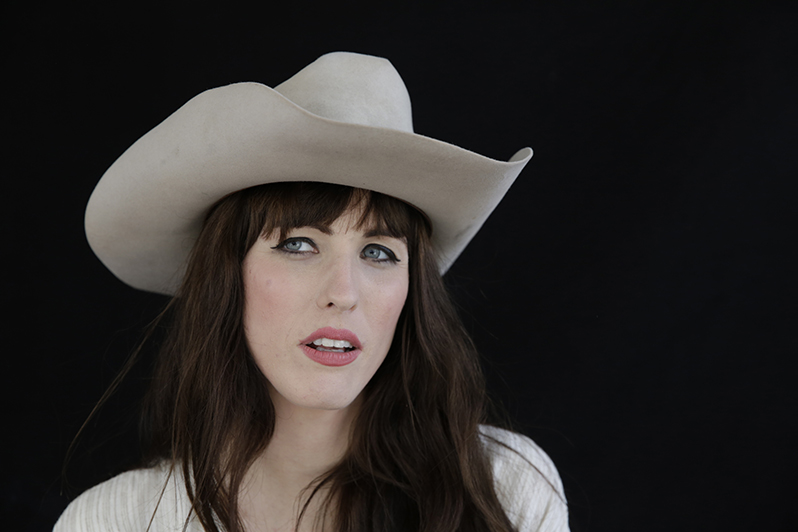
Magdalena Wosinska
This interview has been edited for brevity and clarity.
Wide Open Country: You made Neon Cross with your friend and frequent tourmate Shooter Jennings. Did that close friendship help when recording the album?
Jaime Wyatt: Absolutely. Shooter and his crew have been so supportive. They witnessed me going through a lot of changes over the last few years because we spent a lot of time together on the road. They saw me going through grief and loss and coming to terms with my sexuality and they were so supportive. They believed in me. It always started with music, but as we got to know each other as people...Shooter has really been like a mentor to me. He and his wife just had my back. And in the studio, that was the environment. If I felt apprehensive about something, I could honestly look to them and they'd be like, 'No, this is fantastic.' And I trusted them, you know?
As you said, this album addresses some personal issues and I know that you're a very honest song writer. Was it scary to be so emotionally raw on the songs or did it feel freeing to put all those emotions out there finally?
Man, it was both...I think something that feels really vulnerable is also very freeing to share...To come out in the press and be like, "Hey, this is what this record is about.' You know, coming out as a gay woman. And I've had substance abuse stuff and mental health stuff, but it's also a story of redemption...I do feel free to just be myself and, honestly, the music and the exchange with my fans has given me the confidence to do so. I get to share more of myself with my fan base. It's also more freeing just to become more and more vulnerable.
"Neon Cross" is the title track. What does that song mean to you?
The age old theme with country singers is to be in bar rooms every night. We're sinners. Like Ray Price talking about [how] 'the nightlife ain't no good life, but it's my life. ' It's not an original thought, but calling the album Neon Cross was my way of saying, yes, I've struggled with a lot of personal issues and I am playing in bars at night and wandering this earth just to perform and living a very unconventional life. But I'm still a spiritual being. And I still stand for goodness.
I'm not of a traditional background. I'm a gay woman singing country music and I'm also sober...but I stand for goodness. There's nothing wrong with that. I can still be of service to humankind and celebrate life on earth and my own spirituality and be a country singer in the bars at night.
You recorded "Just a Woman" with outlaw country legend Jessi Colter. What was it like recording with such an important figure?
It occurred to me one day that this song 'Just a Woman' would be much more meaningful if a woman of wisdom could sing it with me. [Someone who] was just a wise veteran of country music. And then I was like, 'Oh, duh. Shooter, can we hire your mom to sing?' [laughs] She cut her vocals and the day the track was sent to me I was with my mother. We listened to it in the car and we both cried.
"Rattlesnake Girl" addresses your sexuality. Could you talk about what that song means to you?
When I start writing a song I don't know where it's going or where it's coming from. I know on a daily basis what particular emotional issues I'm processing, but I don't know where a song is headed until it comes to fruition... I'll start with just a melody and a hook in my mind and then I bring it to an instrument. But when the chorus came about, I was like, 'Oh, this is what I'm going through.' I see my sweet friends out on the weekend, they all look happy and gay. And that was my truth at that moment. [I thought] man, I want what they have because that's my truth. I was like, I want to be out and authentic. I see them so happy and I know that's what I've been missing for some years.
Basically, that song was kind of bookmarking those feelings and coming to the discovery and then also realizing that the next step for me would be coming out and that would be key in my happiness and also staying sober and being honest. So [the line] 'I found my childhood under the Pinewood' alludes to that point. 'I figured it out. Thank God, I'm so happy.'
Did you kind of think about what it would mean to gay country fans to hear an LGBTQ country song?
I was scared for quite a while. For quite a while it was just like, 'Oh, it should be separate. My personal life and who I am should be separate from the public that I release my music to.' I believed that it should be separate because honestly I was afraid that the older or even just more traditional country fans would shun me or unfollow me and stop listening. But really, I just felt like it was more important that I stand in my truth and be visible to young people so that if they were struggling, it might help them. And Lord knows I could have used a little more help as a younger person. So the service is greater than any loss that I might experience due to being honest and being myself.
When I talked to you about Felony Blues, you mentioned listening to a lot of Merle Haggard and how his music helped you use your voice. Was there any artist or album in particular that in any way shaped this album?
Merle talked out about being a felon and going to prison and the shame around that. And that had helped me talk about that. As for other artists that I was inspired by to come out -- definitely Brandi Carlile. I could see how her using her voice was uniting people. Then I saw that Orville Peck was being very well received as country artist and that was very cool.
I observed Kacey Musgraves advocating for LGBTQ people and I thought that was very cool and it was just very heartwarming. So I could definitely see that I could do it too.
Neon Cross is dedicated to influential guitarist Neal Casal, who played on the album. Casal took his own life last year.
"We dedicated the album to him to preserve his memory and his music and also in hopes that in some way, shape or form, we'll be talking more about mental health issues," Wyatt says. "After that loss we just realized how important our fellow artists and musicians are. But really our fellow humans -- it made me realize how important relationships are in my life and how important people are."
Neon Cross is available for purchase here.
Now Watch:
https://rumble.com/embed/u7gve.cc4f1v/
